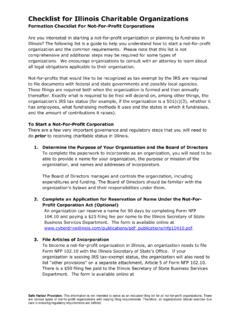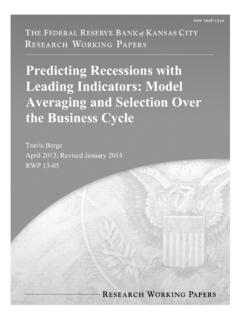Transcription of Predicting Olympic Medal Counts: the Effects of Economic ...
1 Predicting Olympic Medal Counts: the Effects of Economic Development on Olympic Performance Xun Bian I. INTRODUCTION nations' Olympic performance. The influence of pop- T. he modern Olympics were conceived by their ulation size, Economic resources, political and eco- founder Pierre de Coubertin to be competition nomic structure, and hosting advantage are estimated between individual athletes, not countries by using two different models. (IOC, 2000). The Olympic Spirit emphasizes partici- The paper is organized in the following struc- pation rather than winning. In reality however, the ture. Section II introduces the theoretical framework success of a country's athletes is held to be an impor- of the research and reviews previous literature relat- tant source of national prestige. By-country Medal ed to this topic. The empirical model and data used to tables are widely published.
2 A glance at Olympic his- test the research hypothesis are described in detail in tory will immediately tell us that not all nations have Section III. Section IV presents the regression results. an equal ability to win medals. In this past August, Finally, Section V concludes the research by dis- 199 countries participat- cussing possible policy ed in the Athens implications. Olympics, and 124 The success of a country's athletes countries did not win a II. THEORETICAL. single Medal . On the is held to be an important source of FRAMEWORK AND. other hand, the top ten national prestige. REVIEW OF LITER- winners collectively ATURE. took home 514 medals, Starting from the more than 50% of the post-World War II games, medals available at the Athens Olympics. Therefore, sociologists and economists began to analyze the a natural question to ask is why some countries are impact of social and Economic conditions on the able to enjoy a great success in the Olympic arena, number of Olympic medals won by different coun- while others never have the chance to do so.
3 Tries. Examples of those studies are Ball (1972), The unequal distribution of Olympic Medal Grimes et al, (1974) and Levine (1974). Those early numbers might be explained by the relative strength studies showed that population, income per capita, of countries in different sports. For example, with a hosting advantage, and political system have a signif- large number of high-quality basketball players, the icant impact on a nation's Medal counts. First, popu- United States should have a higher probability of lation is one of the fundamental determinants of winning a Medal in basketball. We could then gener- Olympic success. A large population increases the ate a prediction for a national Medal total by a sum- group of potential athletes. As we can see, China wins mation across sports. However, this paper takes a dif- more medals than most other nations, because having ferent perspective and attempts to predict a nation's billion people improves the odds of producing a Olympic performance by investigating the socioeco- Yao Ming.
4 The second determinant is Economic nomic variables that have significant influence on a resources. Richer countries can usually afford to train The Park Place Economist, Volume XIII 37. Xun Bian athletes better, provide better medical care, and send specify a Cobb-Douglas production function for a larger group of athletes to the Olympic Games. Medal shares, using population and Economic Hosting advantage is also significant. The hosting resources (measured in GDP) as production factors. country is allowed to participate in all events. In addi- By specifying a Cobb-Douglas production function tion, the crowd of home spectators will support the form, Bernard and Buss assume that both population performing athletes. More resources are likely to be share and Economic resources should be subject to devoted to training in preparation for the game that diminishing marginal returns.
5 This assumption does will attract so much attention within the home coun- make Economic sense. Holding Economic resources try. The fourth determinant is political and Economic constant, additional talented athletes will inevitably structure. There is a large amount of evidence sug- decrease the fund attributed to each person, and some gesting that communist countries perform better. This athletes might not be able to obtain the training con- is probably because a centrally-planned Economic ditions that are necessary for them to fully exert their system allows more spe- potential. Therefore, the cialization in sports, and marginal contribution of more resources can be population growth to the distributed to training Population, income per capita, Olympic Medal winning and supporting athletes hosting advantage, and political process tends to decline than in market-based as the population size economies.
6 Moreover, system have a significant impact on gets bigger. Conversely, the governments of a nation's Medal counts. holding population con- communist countries stant, additional econom- not only have better ic resources attributed to capability to channel eco- sports should also yield nomic resources to sports but, also have a stronger diminishing returns, as more athletes deplete their incentive to do so. Since Olympic performance is so potential. As we move down the list of athletes, we closely connected with national prestige, winning a encounter more less talented athletes. Spending eco- large number of Olympic medals can help them nomic resources in training those average athletes obtain recognition internationally as well as stimulate will not produce any Olympic medals. In an extreme patriotism domestically. Without having a democrat- case, once all the talented athletes who are capable of ic political system, international recognition and competing for Olympic medals in a country reached patriotism are extremely valuable to the government their physical limits by having ideal training condi- for maintaining political stability.
7 Tions, additional funding would not increase the Surprisingly enough, the literature that models country's Olympic Medal share at all. In addition, Olympic performance did not develop until the Bernard and Busse also include a dummy variable for 1990s. An explanation of this might be that in the the hosting advantage, a soviet dummy, and a non- 1970s and 1980s the Olympic Games were disrupted soviet but planned economy dummy. The hosting by the Cold War. The first study that restarts the per- advantage is estimated to be percentage point of formance analysis is Slughart et al (1993), which ana- the Medal share. The effect of soviet dummy varies lyzes the Olympic performance of transitional between 3-6 percentage points. economies. Recently, two studies by Johnson and Ali Some of the most recent studies go beyond (2000) and Bernard and Busse (2000) revived atten- Medal counts and argue that not all Olympic medals tion to this issue.
8 Johnson and Ali (2000) assume the are alike, and countries with different characteristics Medal counts to be a linear function of GDP per capi- specialize in different sports. Tcha and Pershin (2003). ta, population, and two dummy variables indicating investigates each country's performance and attempt host country and political system respectively. They to identify the determinants of this performance in find that the home advantage adds a 12 percent each sport, while examining other issues related to chance of success, and communist countries outper- specialization at these games, using the concept of form the others by 12 medals (5 gold medals). revealed comparative advantage (RCA). Each coun- Bernard and Busse (2000) estimate probit mod- try's RCA is explained by geographical, biological, els for Medal shares using data since 1960. They and Economic variables of the participating countries.
9 38 The Park Place Economist, Volume XIII. Xun Bian The analyses present the determinants of each coun- countries respectively. P takes the value 1 if the coun- try's specialization in sports and patterns of RCA, try has socialist background, which means the coun- which are substantially different from those obtained try is or was a socialist country, and it takes 0 if oth- by analyzing Medal total. The authors found that erwise. Similarly, if the country is hosting the high-income countries Olympics in that year, specialize less; in other Ht takes the value of 1, words, they win medals in and 0 if otherwise. For a more diversified range High-income countries specialize the research hypothe- of sports. less; in other words, they win sis to be true, the coef- This paper will fol- ficients of all inde- low the two most recent medals in a more diversified range pendent variables need studies on modeling of sports.
10 Be positive. national Olympic per- The second formance and using both model follows the the linear function and the Cobb-Douglas production same notations as Model 1, but uses the Cobb- function to estimate the influence of population size, Douglas production function. It views the Medal win- Economic resources, political and Economic struc- ning process similar to a production process, and the ture, and hosting advantage on nations' Olympic per- two key factors are population size (N) and econom- formance. Based on the results of previous studies, I ic resources (Y), which are both subject to diminish- expect population size and Economic resources are ing marginal return. Hence, the Medal winning positively correlated with a country's Medal share, process could be modeled in the following way: and being a socialist country or a hosting country increases a country's Medal share.
















